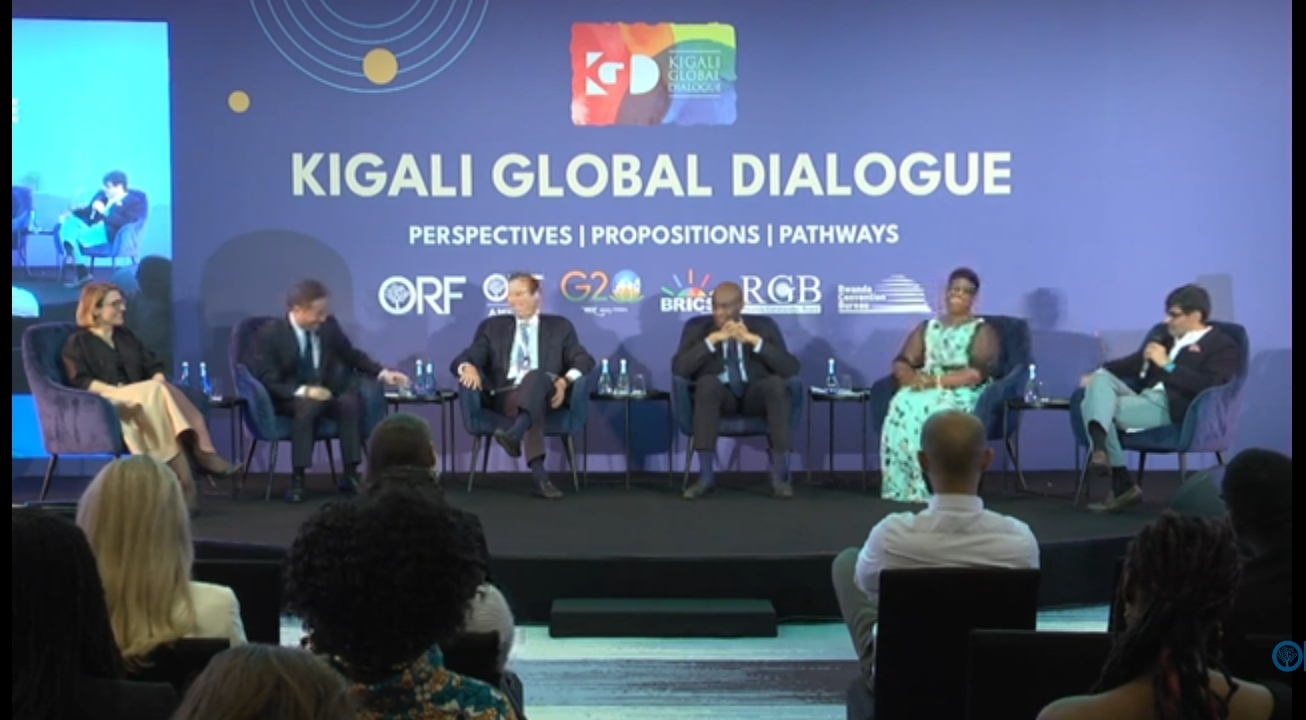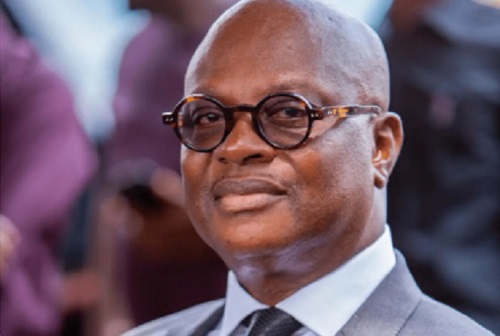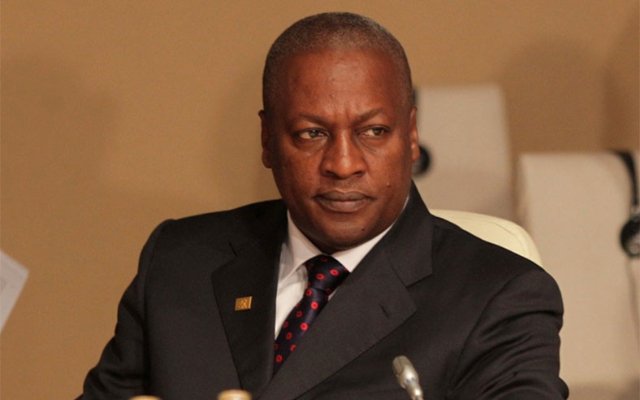By Dolapo Aina
The Kigali Global Dialogue hosted by Observer Research Foundation and Rwanda Governance Board commenced in earnest with a press conference on Monday, 12 June 2023 where representatives of ORF, RGB and Rwanda Convention Bureau engaged the media community. Rwanda had been benefitting from ORF Conferences. It is a relationship that has been mutually beneficial.
Ms. Janet Mukazayire, Rwanda Convention Bureau CEO went thus: “We are seeing people who have established their events here. Moreso, others have gone further to set up their hubs in Rwanda. We are also keen on what impacts conferences like this have on the youthful population of Rwanda via their participation.”
Samir Saran, the President of ORF revealed that: “This is my tenth visit to Rwanda. Many of the big conferences of OFR now see Africa from different lenses. And there have been significant changes since we started having events here. In the past it used to be a prominence of European and American perspectives. The summits for the past three years have been more enriched. We have evolved in the way summits are organised. More countries are represented and eco-systems progressions. When I come to Rwanda, I never have to explain myself for this is Rwanda.”
Dr. Usta Kaitesi: Chief Executive Officer, Rwanda Governance Board stated that: “Rwanda has chosen to embrace talent. When you bring talents to Rwanda, you are talking about humanity. We understand as a country we have reconstructed completely. Africa has the youngest population globally, that means we also have huge challenges.
Engagements and discussions of such nature are very important as Rwanda has decided to pursue a knowledge-based economy. Eco-system of collaboration is one of the benefits of the Kigali Global Dialogue Summits. So much we have learnt and still learning and we won’t be successful if we are only focused on our perspective. Kigali Global Dialogue has been creating more relationships.”
During the welcome address, Samir Saran, the President of Observer Research Foundation re-echoed the thoughts of most delegates when he posited: “We must make sure we fix global governance and not be as helpless as we were during the covid19 pandemic. Underneath the social media noise, when you walk through the streets in Kigali, Johannesburg, there is hope and promise. We all face the challenges of equity at home and outside our different countries.”
In the Chair’s Remarks, Dr. Usta Kaitesi went thus: “Rwanda values the privileges of dialogue. Kigali Global Dialogue is a great opportunity that with dialogue we can survive. In dialogue, you notice the beauty of diversity. It doesn’t make any ideological sense if we limit a segment of the population from advancing. We should make sure our generation appreciates the efforts we adopt and adapt in this century.”
In his ministerial address, Minister of Foreign Affairs and International Cooperation of Rwanda, Dr. Vincent Biruta touched on some areas stating that: “Kigali Global Dialogue is a great occasion to discuss on contemporary global issues.”
Also, “We need to ensure equitable access to technology globally. Gender equity is also paramount and progress must not be confined to a few countries. Kigali Global Dialogue is more than a conference. Meaningful dialogue can create a better world for future generations most importantly, amplifying voices from the Global South.”
During the Fragmented World, Polarised Politics: Crafting Multilateralism that Works session; Sarah Mosoetsa: CEO, Human Sciences Research Council in South Africa opined that: “There are challenges for BRICS and these challenges are frightening for the bloc. And it has to be known that multilateralism has never been in Africa’s favour. Furthermore, the AU, EU, G20 should not be seen as competitors for they can all co-exist as equals.”
Ambassador Sujan Chinoy: Director General, Manohar Parrikar Institute for Defence Studies and Analyses (MP-IDSA) and Chair, T20 India Core Group commenced thus: “Amazing that this session is being discussed in a country that was once fractured. Presently, the world is fractured into seven Ts namely, Trade, Technology, Territory, Terrorism, Tenets, Transparency and Trust. When there is global consensus which was agreed on years ago, why are we re-inventing the wheel? Globalisation has not benefitted all countries equally. Global world order isn’t the way it used to be and there is a denial by several countries on the present situation of the global world order standing. The world needs more than binary choices. Countries cannot be restricted to just two options. We might not like the current world order but it is not easy to scrap the present global system and world order.”
Geo-politics expert Velina Tchakarova: Founder, For A Conscious Experience (FACE), Austria opined that: “In Europe, when it comes to consensus, I am not so optimistic. Presently, Europe is showing symptoms of fracture. There is an emerging polarisation in the EU as most countries are not on the same page. Some member states are already small but don’t realise it yet. When the crisis begins to bite harder, smaller states in the EU would begin to think nationalism and national interests first. The old world is dying and the new world is struggling. We need to wake up and see the world for what it is, not what we wish it to be. We are going to see a lot of bloc-building in the Asia-Pacific region. One of the good stories of this present global scenario is that there would be new players and new collaborations. There would be risks but we should be mindful of the possibilities therein.”
Jovan Ratkovic, a Senior Fellow, Agora Strategy Institute, Belgium posited: “There is not a real joint policy of foreign affairs of the EU. It is important to have African countries as member of G20 but I don’t think we are going to see any reform of international blocs. G20 might be the only and best chance and it must be allowed to thrive. Issue-based partnerships and consensus are still possible and should be encouraged as they would be far more compatible as the old world (20th century) dies in this century.”
During The Young and The Restless: Entrepreneurship, Employment, and Economic Development session, Silvana Lopez: International Business Officer, ClarkeModet & Co in USA revealed that: “My generation is somewhat individualistic when it comes to jobs and creation of jobs. There has been a shift in how generations view jobs. The Generation Z don’t see it necessary to stick in one job or company for a long time.” While, Rania Ayman: Founder and CEO, Entreprenelle based in Egypt further stated that: “Companies cannot engage with the Millennial generation the way they would engage with the Generation Z. People must know the learn how to talk the language of the new generation.”
Day Two commenced with an Insecure World: Digital Disruptions session. Jiten Jain: CEO, Voyager Infosec in India was of the view that: “We (Asian and African Continents) need to invest heavily in our cybersecurity apparatuses. There is a rapid digitalisation of public services and modernisation of the entire systems but inclusion is still a challenge especially in India. We have long given our data for free and that has to stop. We need to regulate data collection of technology companies in Asia and Africa. I believe self-regulation might just be good for motivation but it would apply in this current global reality.”
On her part, Shiotsuka Minako who is the Chief Representative, JICA (Japan International Cooperation Agency), Rwanda stated that: “We need to leverage inter organisational collaborations to be able to firm the grip on the digital disruption regulation.” José Eduardo Malta de Sá Brandão who is the Deputy Director of International Studies, Institute for Applied Economic Research inBrazil stated: “It is not easy to regulate the technology conglomerates but we need to regulate them like when the world understood why plastics needed to be regulated in some countries and banned in some countries.” Clarissa Jazmin Rios Rojas; a Research Affiliate at the University of Cambridge, United Kingdom wen thus: “Technology is risky because human beings make it risky. We need to have more ethical guidance and there should be more enlightenment for it. We need a system-themed approach and ethical values approach are needed.”
During the Governance in the Post-Pandemic World session, Bharat Lal, the Director-General, National Center for Good Governance (NCGG) based in India enthused thus: “During the covid19 pandemic, leadership was what made several countries pull through. Political leadership had to mobilise. Another thing which was apparent was the digital infrastructure and accurate information. Post-pandemic planning is also key and the empowerment of the civil service is vital. These points were focused on by the Modi Administration.” On her part, Dr. Usta Kaitesi: Chief Executive Officer, Rwanda Governance Board, Rwanda stated: “Leadership is always at the centre. Nations cannot just leapfrog digital infrastructure because covid19 hit your country. Before covid19, there were a lot of public services which were already online in Rwanda. The power of a coordinated effort is seen through how the structures exists and work. For me, three factors stand out, Leadership and characterisation of the leaders, citizens and their acceptability to the leadership and thirdly, collaborations. As we deal with challenges of the past, we have to deal with the future simultaneously. The best way of collaborating is to be conscious of each other.”
Anil Sooklal: BRICS Sherpa and Ambassador at Large for Asia and BRICS in a speech stated: “BRICS doesn’t see itself as an alternative to the G7. But it is important to be a collective. Countries have seen this and more in BRICS and align with their views. We need to move away from competition and consternation and move towards collaboration. Some see BRICS as the coalition of the wounded but this is not true. We have to therefore be very careful about BRICS expansion.”
During the Compete and Cooperate: Investing in Our Green Future session, Edward Claessen who is the Head of the Regional Hub for East Africa (European Investment Bank) stated: “To expect more from Governments, is being hopeful but I don’t it. We have to convince them that going into green private investments is a given and the way to go.” Whilst the Nigerian Christopher Ogunmodede: Associate Editor, World Politics Review stated: “Countries from the South have pertinent issues and emergencies that have to be solved and are most are at the front burner. And due to these challenges funds are usually limited if not unavailable for green economy. There has to be a balance.”
Another impactful session was The Next Gold Rush: Critical Minerals panel where Ambassador Susana Malcorra; Former Foreign Minister, Argentina and President, GWL Voices, Spain stated: “We need to be careful when talking about gold rushes, as they don’t usually end well. There is a need for a different approach and thinking on how to extract and export opportunities in the sector. Often times, when we talk global South, we don’t mean it. Africa is Global South. Latin America is Global South. And we need to work together.” On his part, President Jorge Quiroga; Former President of Bolivia and Member, Club de Madrid wen thus: “Latin American countries are taking their economic destiny in their hands and not waiting for the promises of America and EU which keep on changing. Why don’t Latin America and Africa coordinate because we don’t mediate ourselves? We don’t coordinate our agendas regularly.”
During the Women-Led Development: Activating the Levers to Unleash Women’s Economic Power session, Magda Robalo: President and Co-Founder, The Institute for Global Health and Development who hails from Guinea-Bissau stated: “When a girl is sent to school, we see the benefits but we don’t know the statistics when it comes to investing in women’s health. This is usually neglected. Women are usually excluded for clinical trials. When women are healthy, the whole society benefits.”
The Lighthouses in the Dark: Solutions for An Uncertain Time panel had some wise insights from Ambassador Tariq Karim: Director, Centre for Bay of Bengal Studies at the Independent University in Bangladesh, who posited that: “The journey in Bangladesh has not been smooth but we have been moving. If Bangladesh can transition into green energy, we would be able to transform our economy.” On the other hand, Arvind Gupta: Head and Co-Founder, Digital India Foundation in India went thus: “All successful start-ups still cater for the people at the bottom of the pyramid. In the start-up world, copy and paste doesn’t work. There is a lesson there, you have to understand the homegrown dynamics. Start-ups have to localise for that particular market.” Whilst Nancy Mwange who is the Deputy Director, Kenya Institute for Public Policy Research and Analysis, brought up the perfect case study in Kenya, when she posited that the growth of M-Pesa in Kenya was organic.
During the Advancing Feminist Foreign Policy panel, H.E. Susana Malcora: President, GWL Voices and Former Foreign Affairs Minister of Argentina elaborated saying: “Feminist Foreign Policy took root in Latin America decades ago. Rights, Resources and Representation are critical in Feminist Foreign Policy. There is an unholy coalition of conservative minds who want to push back on women rights in some countries. Women are missing at the key tables of peace negotiations. Men and women must be equal partners at these tables.”
On the final day of Kigali Global Dialogue which was a blockbuster of sessions; during the Doing Away with Debt: Rethinking Development Finance session, Ms. Kampeta Pitchette Sayinzoga: CEO, Rwanda Development Bank stated that: Development banks need to think of how they can unlock unavailable local finance. When it comes to National Development Banks and good governance, they usually go through turmoil but always survive. Governance might be a challenge but they do well. Their financials usually show they are strong.” Whilst, Ms. Gwendoline Abunaw Managing Director, Ecobank in Cameroon buttressed further stating: “The money is there, what needs to be worked on are the mechanisms for National Development Banks.”
During the Reimagining Globalisation session, H.E. Moussa Mara: Former Prime Minister of Mali and Member, Club de Madrid poured out some home truths: “We need in some specific African countries some Pan-African leaders who have the African Continent at heart. To change the narrative, we need some concrete implementation. We cannot change the narrative except through concrete political will.”
The Price We Pay? Algorithms, Eternal Growth and Justice session moderated by the famous Armenian-American journalist Lara Setrakian who is the President of APRI Armenia had as sole panellist H.E. Jorge Quiroga: Former President of Bolivia and Member, Club de Madrid who put it point blank: “Whoever produces the content is now the newsmaker. This is the way the internet is going. And potentially it is good news. And we have to realise that phones know more about you than your family members.”
The final session for Kigali Global Dialogue; Whims and Wishes? Ideas that Can Change Our World had some of the most profound and provocative thoughts.
Dr. Usta Kaitesi Chief Executive Officer, Rwanda Governance Board stated that: “We would never succeed if we think our interests are competing. We need political structures and redefine them because they are the basis of our development. These global institutions need the right minds, right attitudes etc and these institutions would give us the right results. We need to go back and interrogate what has made us this selfish.”
H.E. Moussa Mara: Former Prime Minister, Mali and Member, Club de Madrid posited: “Civic societies are the ones who can force Governments to take actions. The UN is still my preferred platform to be heard.”
H.E. Jorge Quiroga: Former President of Bolivia, and Member, Club de Madrid argued that: “The Global South need to self-meet and discuss pertinent issues without waiting to be called by the West for meetings.”
Geo-politics expert, Velina Tchakarova: Founder, For A Conscious Experience (FACE), Austria posited: “Nations’ equality can be achieved if super powers are not allowed to antagonise against each other. Militarisation of space is coming because of the face-off between America and China. Also, G7 is irrelevant. It is a club of a few who are in the past. It doesn’t represent the interest of the majority but the few. With what happened (The 1994 Genocide Against The Tutsi) in Rwanda in 1994 and the transformation, Ukrainians and Russians would have to heal after the war. For there would be a day after the war.”
Samir Saran put it plainly when he stated; “Governance has we know it isn’t working and Collaboration is the most useful tool in current state of global affairs.”
The 2023 edition of the Kigali Global Dialogue lived up to her tradition where the level of conversation, discussions and analysis were unmatched and have remained unmatched. A totally different gathering from what experts in the international relations sphere are accustomed to. The sessions are pretty much what the future entails in Governance and international relations which African governments must review and dissect.

 Boss Of The Week3 days ago
Boss Of The Week3 days ago
 Featured5 days ago
Featured5 days ago
 Middle East3 days ago
Middle East3 days ago
 Headline5 days ago
Headline5 days ago
 The Oracle4 days ago
The Oracle4 days ago
 News5 days ago
News5 days ago
 Islam4 days ago
Islam4 days ago
 Opinion3 days ago
Opinion3 days ago














